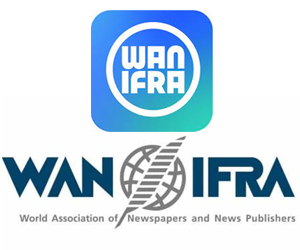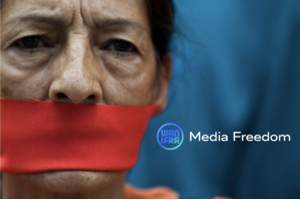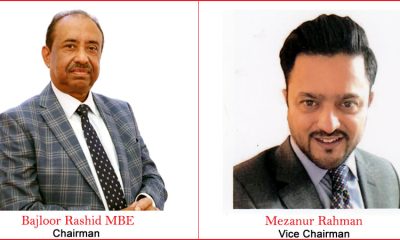Politics
Stronger democratic institutions, governing structures to fuel Bangladesh’s future success:US envoy Miller
Published
4 years agoon
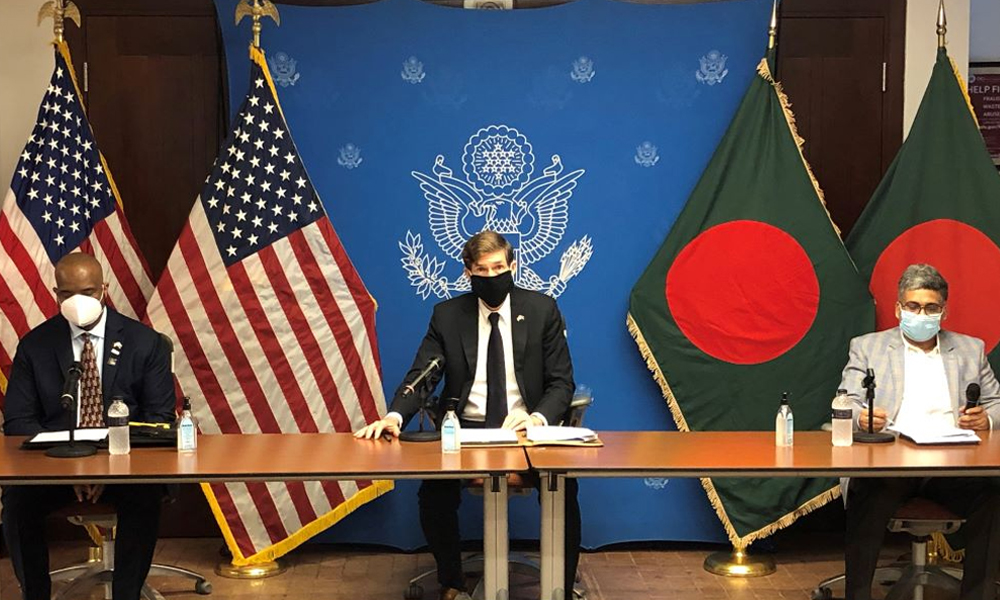
Ambassador Miller said Bangladesh is a nation on the move with great resilience, promise and opportunity but economic development needs to go forward with democratic development
Describing Bangladesh as a young nation of hope and promise with significant achievements in the last 50 years, US Ambassador to Bangladesh Earl R Miller has said Bangladesh’s future success will be fueled by strengthening of democratic institutions and governing structures with a plural and democratic electoral process in place.
“Democracy can only function when all people are fully included, their rights are protected, their voices are heard, and their votes are counted,” he said while delivering a keynote speech at a dialogue held virtually.
Cosmos Foundation, the philanthropic arm of the Cosmos Group, hosted the dialogue titled “Bangladesh-US Relations: Prognosis for the Future” as part of its ongoing Ambassadors’ Lecture Series.
The opening remarks were delivered by Cosmos Foundation Chairman Enayetullah Khan. The session was chaired by Dr Iftekhar Ahmed Chowdhury, a renowned scholar-diplomat and former Advisor on Foreign Affairs of Bangladesh Caretaker Government.
Distinguished Fellow & Board Member at Bangladesh Enterprise Institute (BEI) Ambassador Farooq Sobhan, President of Bangladesh Institute of Peace and Security Studies (BIPSS) Major Gen (Retd) ANM Muniruzzaman, Honorary Advisor Emeritus, Cosmos Foundation Ambassador (Retd) Tariq A Karim and former Principal Secretary to PM Md Nojibur Rahman comprised the panel of discussants.
After a difficult start, Enayetullah Khan said, the relationship between Bangladesh and the USA has largely prospered over the better part of five decades now.
It has prospered on the basis of strong economic ties and people-to-people links, apart from the shared value of freedom and pluralism that is revered by the people of both countries, he said. “In a conflicted world, Bangladesh appears to have no enemies.”
Khan said if a Bangladesh-US relationship can be forged that will advance Bangladesh’s quest for development, and the US aspirations for peace and stability, it can become a model for similar sets of bilateral relations between the US and others.
He said this can be best achieved through deepening the direct links between Dhaka and Washington, and display a strategic dimension of the partnership, one where both see each other as partners in search of peace, stability and growth.
Dr Iftekhar Chowdhury highlighted the importance and significance of reviewing Bangladesh-US bilateral relations with a view to discussing how these could be widened and deepened further to mutual advantage.
With regard to the US, he said, Bangladesh is very much in that country’s radar as a friend and partner.
As Bangladesh graduates out of the list of LDCs, Dr Iftekhar said, American support in obtaining market access will be critical in helping it grow and progress economically.
Bangladesh also must be able to learn to handle the complexities of dealing with America, he said, noting that the US is a unique system globally with many elements within that system both coordinate and compete with one another to contribute to policy making.
The challenge for Bangladeshi diplomacy is to be able to identify appropriate elements of desired outcome and engage them, Dr Iftekhar said.
Democracy & Human Rights
Ambassador Miller said Bangladesh is a nation on the move with great resilience, promise and opportunity but economic development needs to go forward with democratic development; and respect for democracy and human rights are “mutually reinforcing”.
The US envoy, who is at the fag-end of his tenure in Dhaka, said every vibrant democracy must work constantly to live up to its founding ideals and commitment to human rights and social justice for all citizens.
As a friend, Miller said, he raised the issues of concern over human rights at the highest levels as he finds it an important part of his job to promote accountability and strengthen human rights and democracy in Bangladesh. “And those conversations are always honest, direct and respectful.”
The US envoy said the United States supports “free, fair, credible, participatory and peaceful elections” that reflect the will of the Bangladeshi people.
He said they support a plural and democratic electoral process with protections for voters and participants set out so admirably in Bangladesh’s constitution.
In every country, the US diplomat said, it is important that all political parties, voices and all voters can participate and have confidence in the electoral process.
Miller said freedom of the press and expression is vital for any healthy democracy while media, civil society members, opposition groups, and peaceful protesters must be able to express their views and advocate for change without fear of retribution. “Voices of dissent and disagreement need to be heard and respected.”
The US envoy said he believes that the strongest democracies flourish from frequent and lively debate and the two countries can have these candid conversations and disagreements over these concerns while maintaining close partnership.
Summit for Democracy
About the Summit for Democracy that began on Thursday, the Ambassador said the Summit is a two-part process and the second one will be an in-person meeting at about this time next year.
To get invited, he said, participants will need to show a commitment to the Summit’s areas of focus, strengthening democracy, defending against authoritarianism, addressing and fighting corruption and promoting respect for human rights.
Miller said not all democracies are able to attend the Summit but all who value democracy can support the tenets of the Summit and strive for progress in advancing democratic principles.
“And I obviously hope we’ll have continued engagement on this topic with government officials in the coming weeks. But in the long run, the US is seeking to engage any and all countries that show a genuine willingness and making commitments that support the Summit’s goals,” he said.
Former Ambassador Farooq Sobhan said this is an issue which obviously has caused some measure of concern in Dhaka as people seek to know why Bangladesh has not been invited to the Democracy Summit.
“So, perhaps some people see this as a way of conveying a message that maybe we need to make some improvements in Bangladesh,” he said.
The veteran diplomat said they have been told, within quotes from reliable sources, that Bangladesh will be invited to the next democracy Summit, which hopefully will be an in-person one.
One of the issues which featured prominently in his many conversations is how Bangladesh with its remarkable achievements takes this relationship to the next level.
“If you look back over the last 50 years, there have been different issues which have in a sense, dominated the relationship in the early years, ” Farooq Sobhan said, adding that “how do we handle these complexities in the relationship, I think, that’s going to be a major challenge.”
But he sees enormous opportunities in the relationship and said Bangladesh and the US have a very diverse relationship.
BIPSS President Muniruzzaman said, “Our relationships are enduring, and they grow from strength to strength. We need to nurture them, and fundamental to everything as Ambassador did mention in his remarks, is the growth, sustenance and development of democracy in Bangladesh.”
He said, “Bangladesh needs a greater presence in US media if it wants to increase its profile and increase understanding of our positions there.”
Therefore, the security analyst said, media engagement has to be effective between the two countries.
Digital Security Act
Ambassador Miller said the Digital Security Act can be used to suppress and criminalize free speech and it is important not to confuse digital security with cyber security.
A focus on control of digital media can distract from much needed efforts to protect against malicious cyber security threats, he said.
Miller said they are concerned about arrests and arbitrary detention of journalists and civil society activists under the DSA and encouraged the government of Bangladesh to revise the law to bring it into conformity with Bangladesh’s international commitments on human, civil and political rights and to ensure it provides for checks and balances against arbitrary arrest and other undue restrictions on the right to legitimate exercises a freedom of expression.
He said the US values freedom of expression, including online expression, as a key component of democratic governance.
“And I really appreciate the dialogue we’ve been able to have with the government of Bangladesh on how to improve legislation to ensure Bangladesh’s security is addressed. But not at the cost of its own democratic principles,” said the US envoy.
Former Principal Secretary Nojibur Rahman said the current leadership of Bangladesh is fully committed to the issues of governance and human rights.
He said the constitution is enshrined on the values of good governance and human rights, which was formulated by Father of the Nation Bangabandhu Sheikh Mujibur Rahman.
“So, when the ambassadors meet the leadership, the head of the government –the Prime Minister– makes it unequivocally clear that her government is fully committed to the high standard of good governance and human rights,” said the former Principal Secretary.
Former diplomat Tariq Karim recalled that the administration of the US was hostile to Bangladesh in 1971, but people were very fond. “Ultimately, the relationship that was established even during the Liberation War was between the people of Bangladesh and the people of the United States.”
As the US Ambassador talked about democracy and good governance in Bangladesh, he said, “We’re a fiercely proud nation and I think our history and our reactions to major pressures on us in history have shown how we can stiffener back and take on powers superior to us, if necessary, even at our own cost but we won’t bend to that.”
Therefore, Tariq Karim said, when big powers or anyone external tries to force them into a direction, they probably come up with some sort of an opposing force either seen or unseen.
The foreign affairs analyst thinks everyone in such dealing should keep in mind that ultimately citizen to citizen, people-to-people relations, and human nature and human reactions on the ground level will translate into politics and will reconfigure the shape of politics if push comes to shove.
“Every democracy is still working and in progress. No one can give a lecture to other democracies about how to do it as each nation has its own way of doing it. I think the focus should be more on helping those countries build up resilience and capacities in the areas they are lacking,” he said.
When nations are confident, most of the other things come into play automatically and they will do so organically in a natural way, Tariq Karim observed.
“But if we try to force it, those countries have their own egos, their own self-respect and their own identities, they’ll stand up and push back. It won’t help achieve the larger goals that we’ve in our minds,” the diplomat mentioned.
You may like
-
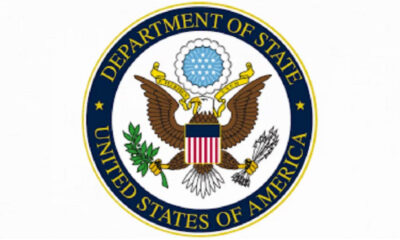

‘US does not favour one party over the other’
-
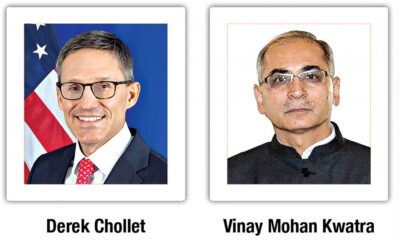

2 top officials from US, India arrive in Dhaka today
-
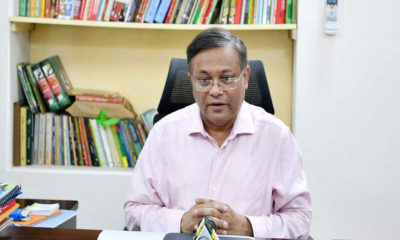

Hasan questions human rights situation in US
-
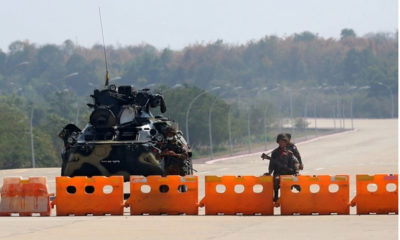

US issues sanctions on alleged arms dealers for Myanmar junta
-
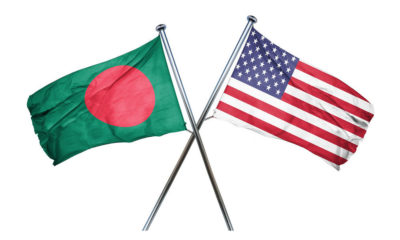

US sees progress but indicates no sanction withdrawal
-
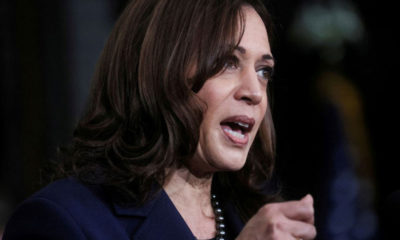

US takes steps to counter Ukraine crisis, energy costs
Politics
Foreign powers like US behind my ouster: Indian media quotes Hasina
Published
11 months agoon
August 11, 2024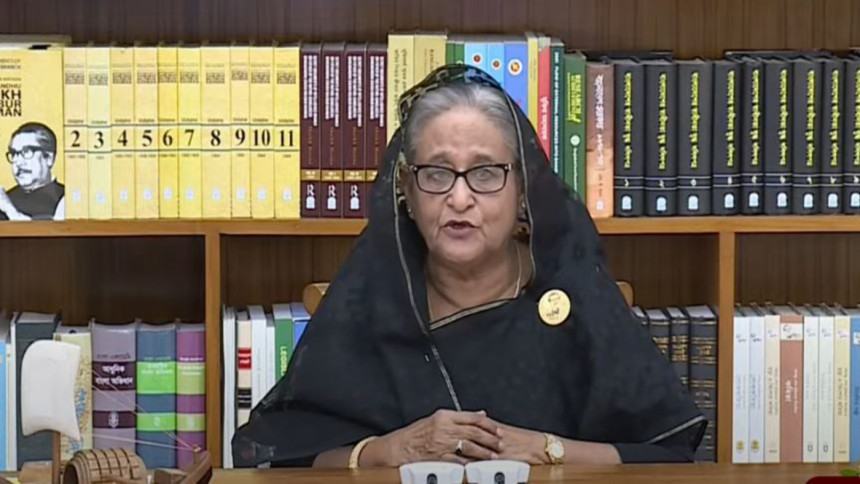
In what is being called in Indian media to be her first statement since resigning and fleeing the country on August 5, former prime minister Sheikh Hasina has accused foreign powers like the US of playing a hand in her ouster.
Indian news outlet The Print in an article today said it had seen the message conveyed to Hasina’s Awami League supporters. India’s Economic Times also carried an article about the message, which The Daily Frontline has not been able to independently verify.
“I could have remained in power if I had left St Martin and the Bay of Bengal to America,” she said in the message.
According to The Print, the Hasina government saw strained relations with the US for many years. Ahead of January’s elections this year, she said “a white man” had offered her a smooth return to power in exchange for an airbase.
Hasina also warned the new interim government not to be “used” by such foreign powers.
Led by Nobel Laureate Muhammad Yunus, the new interim government was sworn in on Thursday night, three days after Hasina’s ouster.
“I resigned so that I did not have to see the procession of dead bodies. They wanted to come to power over your [students’] bodies, I did not allow it. I came with power,” read Hasina’s statement.
“Maybe if I was in the country today, more lives would have been lost, more wealth would have been destroyed,” she added.
She is also expected to address the media while in India next week, The Print article said.
Sheikh Hasina resigned as prime minister and fled Bangladesh on August 5, when a student-led protest culminated in a mass uprising against her Awami League government.
More than 400 people were killed in the preceding three weeks, a majority of them in police firing and firing by Awami League activists.
The US is Bangladesh’s largest foreign direct investor.
In her message to supporters and party cadres, she vowed to return to the country, though accepting her defeat.
“I will return soon inshAllah. The defeat is mine but the victory is [that of] the people of Bangladesh,” she stated.
“I removed myself, I came with your victory, you were my strength, you did not want me, I myself then left, resigned. My workers who are there, no one will lose morale. Awami League has stood up again and again,” she added, according to The Print.
The former prime minister also accused people of distorting her words.
“I want to repeat to my young students, I never called you Razakars … My words have been distorted. A group has taken advantage of your danger,” she said in the message.
The term “Razakar” is considered to be derogatory in Bangladesh as it refers to ‘volunteers’ who collaborated with the Pakistan Army during Bangladesh’s 1971 war for independence.
Politics
Regulator orders freeze on bank accounts of Hasan Mahmud, family members
Published
11 months agoon
August 11, 2024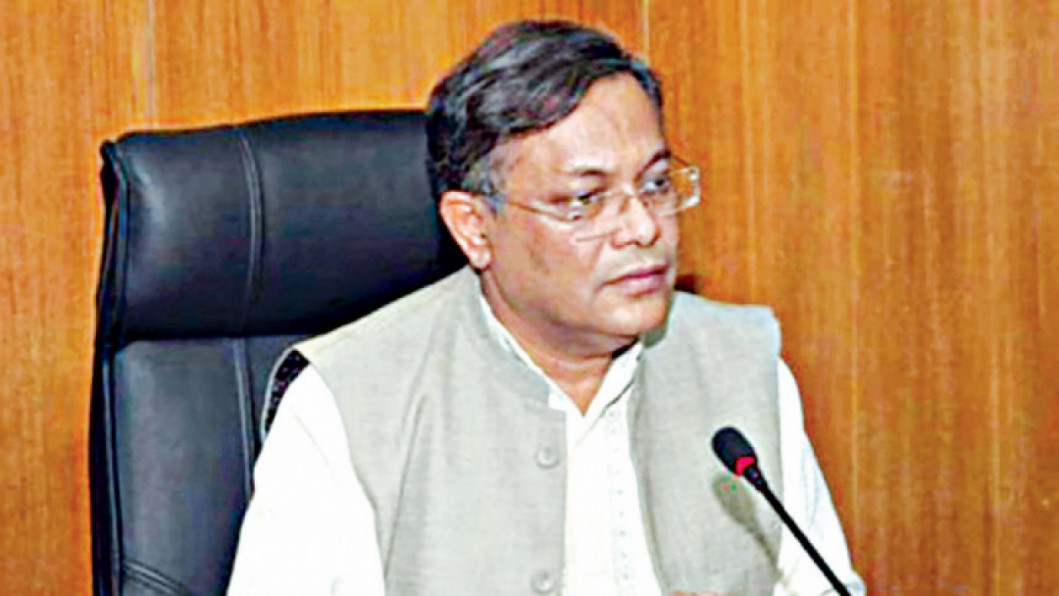
The Bangladesh Financial Intelligence Unit has ordered banks to freeze all accounts of former foreign minister Hasan Mahmud and his family members.
A senior official of the anti-money laundering agency confirmed it.
The BFIU asked the banks to block all types of withdrawals through the individual or business accounts of Hasan Mahmud, his wife Nuran Fatema, and their daughter Nafisa Jumyina Mahmud.
Politics
Police can’t be used as killers, henchmen anymore: Sakhawat
Published
11 months agoon
August 11, 2024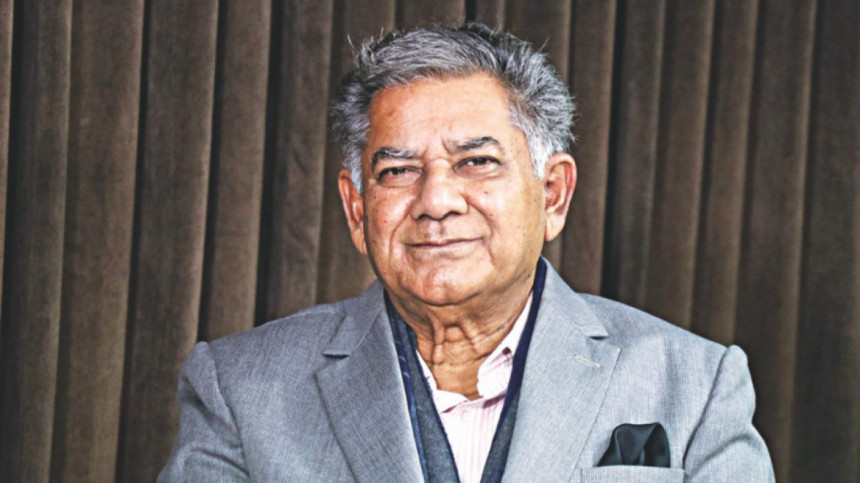
Home Affairs Adviser Brigadier General (Retired) M Sakhawat Hussain today said members of the police force cannot be used as killers or henchmen anymore.
“Police has been given lethal weapons. I was surprised to see 7.62 (firearms) at police’s hand. They were given those weapons 15 to 20 years back … Police should not be given these weapons,” the adviser said.
He was talking to media at the Central Police Hospital in Dhaka after visiting police members who suffered injuries in clashes during the recent mass protests.
The adviser condemned both the killings of general public by shooting and murders of police during the protests.
“I am telling politicians that it will be difficult to do politics now. You can’t use police like killers and henchmen anymore,” he added.
“I will insist that police will run under the police commission. Orders from anyone will be given to the police commission, and they [the commission] will decide what to do,” he said.
“Every day, incidents of robbery are going on as there are no police on the streets. Police are demoralised,” he added.
“Unjust things have happened … I will try to severely punish those who ordered [killing of people by shooting] either at home or abroad,” he said.
“The politics of Bangladesh is the politics of sycophants. Such flattery is created that people are dying and they say nothing happened,” he added
He asked police members not to apply excessive force.
“Our society can’t run without police,” he said.
The adviser said what the army is currently doing was not their job. But they are still doing it. They were even attacked in Gopalganj.
“A state cannot run like this. Politics of a state cannot go on like this. Bangabandhu has of course contributed, but thousands of people fought and 30 lakh people were killed to liberate the country. The state is not anyone’s personal property,” he said.
“I saw what happened in the country through BBC. But our media said nothing had happened. If media had played an objective role, police would not face this situation. Shame on you.
“A country is submerged when the media does not speak the truth,” he said.
He threatened to shut down media outlets if they are biased towards any one entity.
Regarding the 11-point demand of police members, the adviser said, “They did not want the sky and the moon. Their demands will be met, [but] it may take time to meet some of the demands.”
He urged people to cooperate with police to bring the situation to normal.
Over 400 people including some policemen were killed and several thousand others were injured after in the monthlong protests that eventually forced Prime Minister Sheikh Hasina to resign and flee the country on August 5.

Bajloor Rashid Elected Chairman, Mezanur Rahman Elected Vice Chairman of Progressive Life Insurance

WB to provide $250m loan to modernise five public sector functions

A10 Networks Expands its Cybersecurity Portfolio with Acquisition of ThreatX Protect









